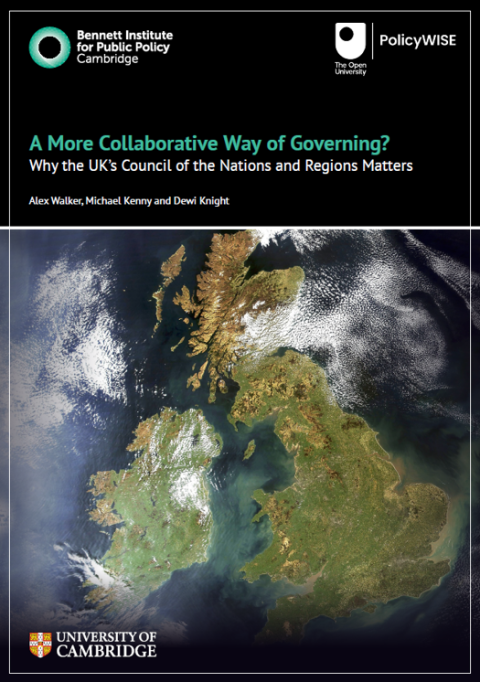New report calls for step change in UK Intergovernmental Relations through the Council of the Nations and Regions

Today PolicyWISE and the Bennett Institute for Public Policy publish a landmark report on the Council of the Nations and Regions, a major innovation at the heart of the UK’s evolving model of territorial governance. This new body, created by the new UK Labour government elected in 2024, aims to foster collaboration between the UK government, devolved governments, and English regional mayors.
The report, authored by Alex Walker, Michael Kenny, and Dewi Knight, provides the first substantial examination of this flagship intergovernmental initiative.
It highlights the potential for the Council to improve relationships between the UK government and the devolved governments and English mayors, even if these are led by leaders from different political parties. The Council could fill a long-standing void in the model of territorial government within the UK, which has lacked mechanisms for genuine collaboration between its various governing authorities.
As one of the flagship commitments within Prime Minister Keir Starmer’s wider agenda to reset intergovernmental relations and strengthen English devolution, the Council has the potential to set a new ethos of partnership working across the UK.
The report also addresses the administrative need for leaders of these governments and authorities to come together more often to work through areas where their policy responsibilities overlap. It emphasises the importance of developing a better understanding of each other’s priorities and working together to address key strategic policy challenges that cut across the boundary line between devolved and reserved powers.
To make this initiative work, flexibility from all its participants will be necessary. For the UK government, this may involve ceding some ownership of the Council and viewing it more as a co-production. This message may not be an easy one for Whitehall to hear, but it is an implication of moving towards a more collaborative and productive mode of engagement. A similar ethos needs to inform the approach of the devolved governments and English mayoral leaders. Making the Council work is a two-way street.
The report draws on interviews with key policymakers in each UK nation, a review of existing intergovernmental structures, research and international case studies, and a historical appreciation of the distinctive ways in which relations between government heads have been institutionalised in the UK context, since devolution was first introduced.
Professor Michael Kenny, Inaugural Director of the Bennett Institute for Public Policy, University of Cambridge, says: "The Council of the Nations and Regions represents a significant step forward in fostering collaboration between different levels of government in the UK. It has the potential to improve relationships and address key policy challenges in a more coordinated manner".
Dewi Knight, Director of PolicyWISE, The Open University, added: "Flexibility and a willingness to engage constructively are essential for the Council to succeed. All participants need to be open to collaboration and working together – no matter where policy responsibility rests - to achieve shared goals".
The UK stands at a critical juncture. Strained relationships between central government and devolved administrations, the evolving role of elected mayors, and a shifting geopolitical environment all demand new ways of working. The Council provides a rare opportunity to bridge divisions—but only if it is purposefully designed and seriously supported.
To see more work from PolicyWISE examining the gains and losses from 25 years of devolution see our roundtable reports from Edinburgh, Cardiff and Belfast or contact us at policywise@open.ac.uk
